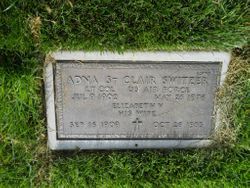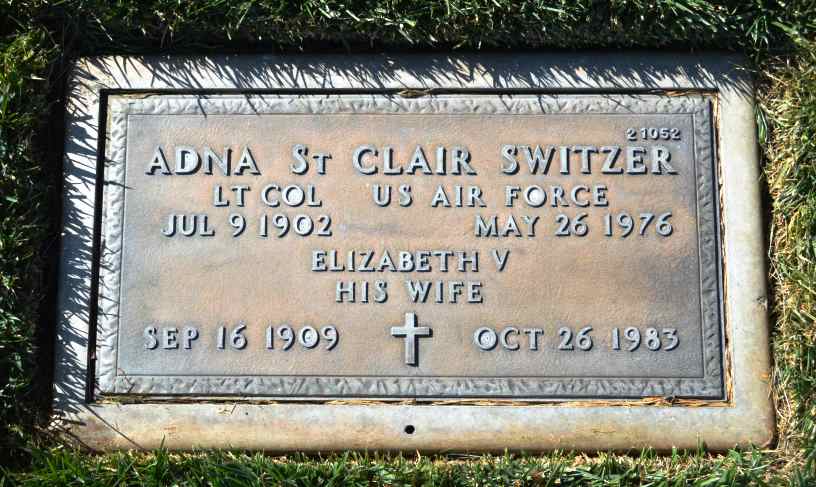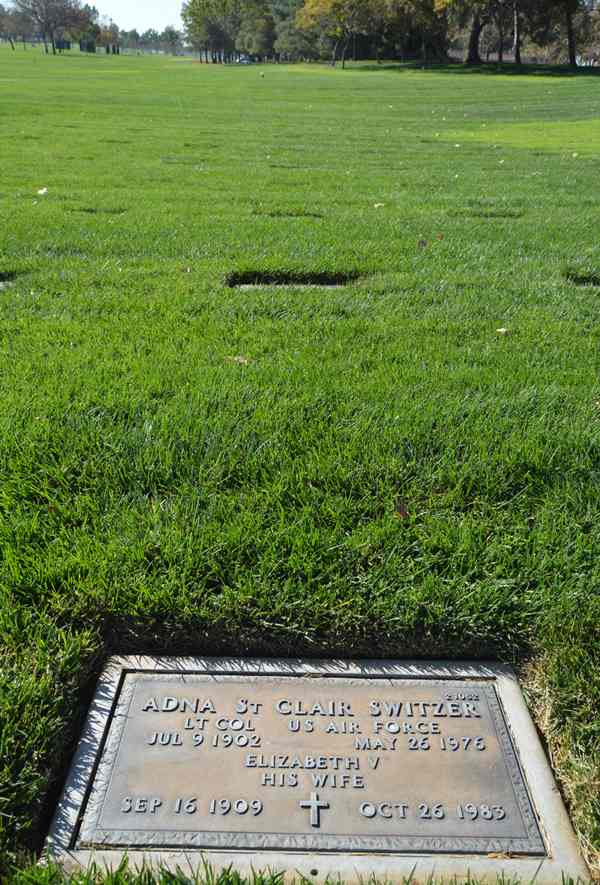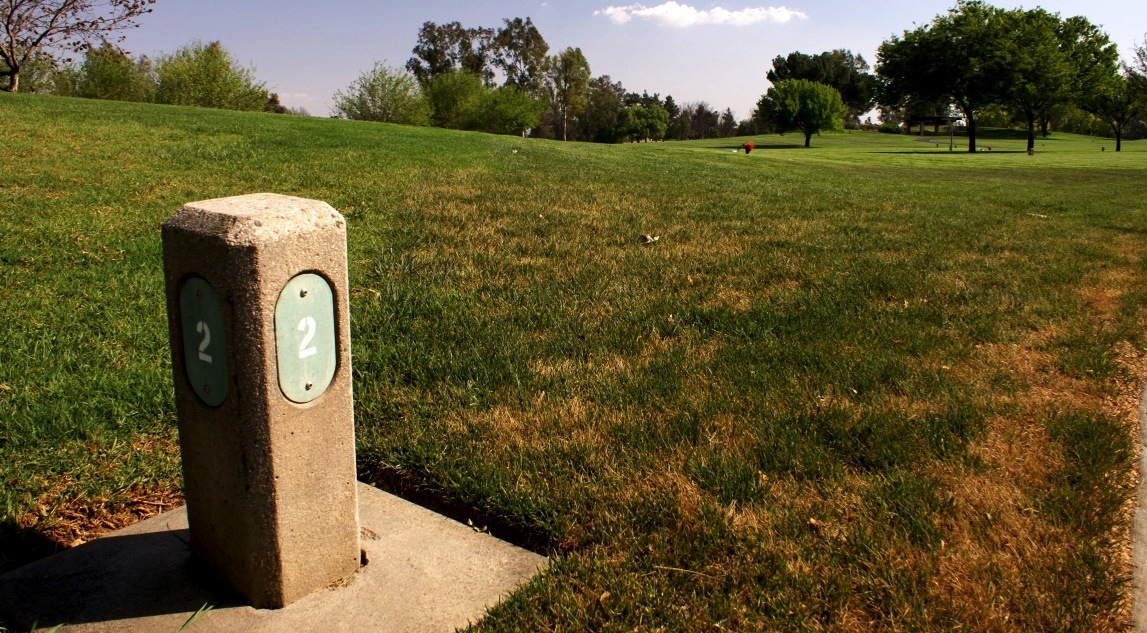A MEMORIAL TO ST. CLAIR ADNA SWITZER
St. Clair Adna Switzer, the son of George and Abbigail Whitner Switzer, was born in Milford, Michigan, on July 9 1902. He graduated from high school in Farmington, Michigan in 1919, and before entering Miami University in 1924, he saw service in the United States Navy and was graduated in pharmacy from the Ferris Institute. He received and AB degree from Miami in June, 1928. A member of Phi Eta Sigma and Phi Beta Kappa, he was a psychology major and a member of the Sigma Alpha Epsilon social fraternity, which he served as President.
The influence of then Assistant Professor E. F. Patten may have been responsible, at least in part, for his continuing his graduate education at the University of Wisconsin with Professor C.L. Hull, who shared his life-long interest in the assessment of aptitude and who was to become one of the most eminent of American psychologists. He and Elizabeth Virginia Hezlep were united in marriage on December 20, 1928, and after receiving the AM degree from Wisconsin in June 1929, he returned to Miami University as an assistant professor. This position was held until 1932, at which time he began work toward the PhD in the field of experimental psychology at Yale, again under Professor Hull. Those years were golden and vital years at Yale as a result of the heady ferment of a new school of psychology, at once experimental, quantitative, and theoretical in character, that was developing in Professor Hull’s laboratories and where “Doc” Switzer, a name he owed to his training as a pharmacist, played an important role. His early work on the phenomena of classical conditioning led to an important discovery, and he was instrumental in helping Hull bring to fruition a major chapter in Carl Murchison’s “Handbook of Experimental Psychology,” and a fundamental book, “Hypnosis and Suggestibility.”
After receiving the PhD degree from Yale in 1934, he again returned to Miami University, and he was to spend his entire academic career at his Alma Mater. In May 1942, following the outbreak of World War II, he became head of the Test Construction Unit of Occupational Standards, Civilian Personnel Section, of the Army Air Forces at Wright Field, Ohio. In August 1942, he was commissioned a captain in the Army Air Forces; he completed active military service in 1946 with the rank of lieutenant colonel after duties as Command Classification Officer and Personnel Consultant at Headquarters of the Fist Troop Carrier Command in Indianapolis, as head of the Psychology Branch at Redistribution Center One in Atlantic City, and finally, as Chief of the Air Force Demobilization Procedures section in Washington, D.C.
On returning to Miami University, he was named Professor and became Chief Vocational Appraiser in the Veterans Guidance Center; in 1949, he resumed his advising of Miami students and teaching in the department of psychology. He became the chairman of the department of psychology in 1961, succeeding Dr. E.F. Patten, who had served as chairman since the establishment of a separate department in 1946. He served as chairman until retirement in 1965. During his tenure in that position, the University was repidly expanding and, under his direction, plans were laid for increasingly active graduate programs in psychology and for a new behavioral sciences building, the current Benton Hall. He served the department and the University faithfully and well.
In the summers of 1956 and 1957, Dr. Switzer was a consultant on the new psychology program at the Air Force Academy, and he retired from the Air Force Reserve in 1963 with the rank of lieutenant colonel.
Professor Switzer was the author or coauthor of numerous research studies and his chapters in the “Handbook of Applied Psychology” and the “Personnel Handbook” were especially well received. He was a Diplomate of the American Board of Examiners in Professional Psychology, a member of the Society of Sigma Xi, and a life member of the Midwestern and American Psychological Associations.
He was a friendly, quiet man of incisive intellect—a scholar, one who was well liked by his students and who was quick to earn the respect of others. He was a lively and stimulating conversationalist, a genial and gracious host, and a warm, dependable, and understanding companion. His colleagues in his department and on this campus have many fond memories of him, and the University was fortunate to have had his presence here. He died peacefully in his sleep on the night of May 25, 1976. He leaves his wife Elizabeth, a daughter, Gail, two grandchildren, and many good friend.
A MEMORIAL TO ST. CLAIR ADNA SWITZER
St. Clair Adna Switzer, the son of George and Abbigail Whitner Switzer, was born in Milford, Michigan, on July 9 1902. He graduated from high school in Farmington, Michigan in 1919, and before entering Miami University in 1924, he saw service in the United States Navy and was graduated in pharmacy from the Ferris Institute. He received and AB degree from Miami in June, 1928. A member of Phi Eta Sigma and Phi Beta Kappa, he was a psychology major and a member of the Sigma Alpha Epsilon social fraternity, which he served as President.
The influence of then Assistant Professor E. F. Patten may have been responsible, at least in part, for his continuing his graduate education at the University of Wisconsin with Professor C.L. Hull, who shared his life-long interest in the assessment of aptitude and who was to become one of the most eminent of American psychologists. He and Elizabeth Virginia Hezlep were united in marriage on December 20, 1928, and after receiving the AM degree from Wisconsin in June 1929, he returned to Miami University as an assistant professor. This position was held until 1932, at which time he began work toward the PhD in the field of experimental psychology at Yale, again under Professor Hull. Those years were golden and vital years at Yale as a result of the heady ferment of a new school of psychology, at once experimental, quantitative, and theoretical in character, that was developing in Professor Hull’s laboratories and where “Doc” Switzer, a name he owed to his training as a pharmacist, played an important role. His early work on the phenomena of classical conditioning led to an important discovery, and he was instrumental in helping Hull bring to fruition a major chapter in Carl Murchison’s “Handbook of Experimental Psychology,” and a fundamental book, “Hypnosis and Suggestibility.”
After receiving the PhD degree from Yale in 1934, he again returned to Miami University, and he was to spend his entire academic career at his Alma Mater. In May 1942, following the outbreak of World War II, he became head of the Test Construction Unit of Occupational Standards, Civilian Personnel Section, of the Army Air Forces at Wright Field, Ohio. In August 1942, he was commissioned a captain in the Army Air Forces; he completed active military service in 1946 with the rank of lieutenant colonel after duties as Command Classification Officer and Personnel Consultant at Headquarters of the Fist Troop Carrier Command in Indianapolis, as head of the Psychology Branch at Redistribution Center One in Atlantic City, and finally, as Chief of the Air Force Demobilization Procedures section in Washington, D.C.
On returning to Miami University, he was named Professor and became Chief Vocational Appraiser in the Veterans Guidance Center; in 1949, he resumed his advising of Miami students and teaching in the department of psychology. He became the chairman of the department of psychology in 1961, succeeding Dr. E.F. Patten, who had served as chairman since the establishment of a separate department in 1946. He served as chairman until retirement in 1965. During his tenure in that position, the University was repidly expanding and, under his direction, plans were laid for increasingly active graduate programs in psychology and for a new behavioral sciences building, the current Benton Hall. He served the department and the University faithfully and well.
In the summers of 1956 and 1957, Dr. Switzer was a consultant on the new psychology program at the Air Force Academy, and he retired from the Air Force Reserve in 1963 with the rank of lieutenant colonel.
Professor Switzer was the author or coauthor of numerous research studies and his chapters in the “Handbook of Applied Psychology” and the “Personnel Handbook” were especially well received. He was a Diplomate of the American Board of Examiners in Professional Psychology, a member of the Society of Sigma Xi, and a life member of the Midwestern and American Psychological Associations.
He was a friendly, quiet man of incisive intellect—a scholar, one who was well liked by his students and who was quick to earn the respect of others. He was a lively and stimulating conversationalist, a genial and gracious host, and a warm, dependable, and understanding companion. His colleagues in his department and on this campus have many fond memories of him, and the University was fortunate to have had his presence here. He died peacefully in his sleep on the night of May 25, 1976. He leaves his wife Elizabeth, a daughter, Gail, two grandchildren, and many good friend.
Inscription
US AIR FORCE LTCOL WORLD WAR II, KOREA
Family Members
Sponsored by Ancestry
Advertisement
Explore more
Sponsored by Ancestry
Advertisement









